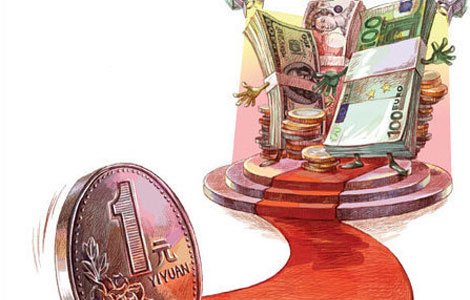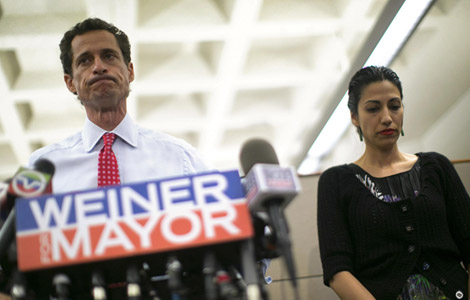Culture gap proves a challenge for booksellers
Updated: 2013-07-22 11:18
By Kelly Chung Dawson (China Daily)
|
||||||||

HarperCollins recently announced its purchase of the Chinese novel Zu Jie by author Xiao Bai for $60,000, for publication in English for the Western market. The noir thriller will be published in 2015 under the English name French Concession. The purchase is part of a trend, signaling increased interest in Chinese literature among Western publications and readers.
China's book market is now the world's largest, publishing 7.7 billion books in 2011, a 7.5 percent increase from 2010. Of those books, 48 sold more than one million copies. Most of those titles were written by Chinese authors for Chinese readers, but Western books translated into Chinese also feature prominently.
Western titles printed in English also have a niche; Walter Isaacson's biography of Steve Jobs sold more than 50,000 copies in China. According to Penguin China, George Orwell's 1984 was its best-seller in 2011, signaling a desire for both aspirational writing (as evidenced by the Jobs biography), and high-quality classic Western literature. However, most Chinese readers purchasing English literature do so to improve their English, which can also determine the types of English-language books that become most popular.
Since Chinese author Mo Yan received the Nobel Prize in Literature in 2012, Western publishers and readers have become increasingly interested in Chinese literature for the Western market. Penguin China recently published the popular Chinese novel The Civil Servant's Notebook in translation, capitalizing on the popularity of "officialdom lit", a genre that describes the inner workings of Chinese society and government. Penguin China also recently published an English translation of Sheng Keyi's Northern Girls, a story about the lives of migrant factory workers.
In 2012, the London Book Fair invited 21 Chinese authors to participate. AmazonCrossing, a new launch from Amazon.com, published its first Chinese novel translated into English earlier this year.
However, the growth and popularity of Chinese fiction outside of China is still in its infancy. American readers have not demonstrated a huge appetite for foreign literature; in 2012, 453 foreign titles were purchased by US publishers, amounting to around 3 percent of all US book publications. According to Bloomberg Businessweek writer Christina Larson, who spoke with a US-based publisher, only 16 of those books were first published in Chinese. Although English translations have made foreign authors like Haruki Murakami and Gabriel Garcia Marquez extremely successful, those authors are not the norm.
Over the years, a few Chinese books have made the international bestseller lists, including Adeline Yen Mah's Falling Leaves and Jung Chang's Wild Swans. Both authors were based in the West, and wrote about their painful memories of China in a style that has been described as "scar literature." Western readers have responded most to this kind of Chinese fiction, written from a single perspective and focused on a narrative of struggle. More recently, Wei Hui's Shanghai Baby novel about hard-partying youth in 1990s Shanghai enjoyed popularity overseas, a success that has in part been driven by its ban in China; Western editions explicitly advertise the book's verboten status at home.
Chinese fiction's slow start in the Western market has been attributed to differences in perspective and focus among Chinese writers.
Duncan Jepson, a founding member of the Asia Literary Review, believes that Wang Shuo's Playing for Thrills never caught on in the West because the author's writing style meandered, and focused less on individual characters. Western readers prefer a more specific perspective, and a linear narrative.
Western literature has also often taken for granted the reader's default view of the importance of personal freedom. The most popular Chinese novels are written in a style that reflects a significant difference in the way Chinese culture views story-telling, personal narrative and the role of the individual. For many Western readers, that gap can be hard to overcome.
Books about China from a Western perspective (written by English-speaking writers for an English-reading audience) have been popular over the last decade, as China's economy has opened up opportunities for Americans hoping to cash in abroad. But the focus on Western perspectives on China - as opposed to Chinese perspectives on their own country - is limiting, Jepson believes.
A number of publishing companies and publications are doing their best to translate (both literally and culturally) the best of what Chinese literature has to offer. Penguin China has published around four Chinese titles in English translation each year since its founding in 2005.
The company imports English-language books, publishes Chinese books in English, and has also published around 150 Chinese-language books.
Western publishing companies are not permitted to sell directly, so a network of local retailers and publishers assist. Paper Republic, an online publication, also focuses exclusively on Chinese literature translated for English readers.
Contact the writer at kdawson@chinadailyusa.com
(China Daily USA 07/22/2013 page2)
Most Viewed
Editor's Picks

|

|

|

|

|

|
Today's Top News
US diplomat says China ties a priority
Nation falling short on IT security
Weiner not dropping out of NYC mayoral race
Death toll from H1N1 in Argentina reaches 38
DPRK halt on rocket facility confirmed
Celebrations erupt after word of regal delivery
Office to close due to protest in Manila
Multinationals' dependence on China grows
US Weekly

|

|














